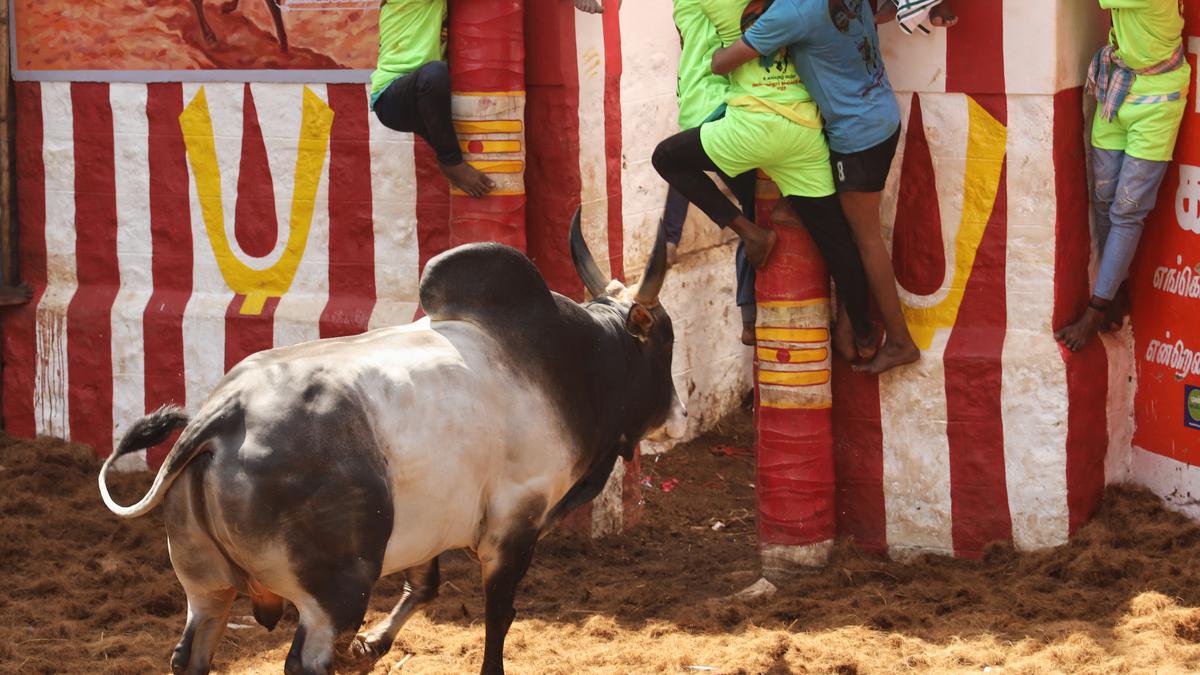
Explained | How has the Supreme Court validated Tamil Nadu’s stand on jallikattu? Premium
The Hindu
Why has the Supreme Court judgment brought cheer to the Tamil Nadu government and supporters of jallikattu?
The story so far: Jallikattu, the traditional rural sport involving bulls, has received judicial approval. A Constitution Bench of the Supreme Court has ruled that the amendment made in 2017 by the Tamil Nadu Assembly to the Prevention of Cruelty to Animals Act, 1960, facilitating the smooth conduct of the sport with stringent regulations, is valid. The court has, thus, settled the question whether the sport should be disallowed on the ground that it involves unnecessary cruelty to animals and violates animal rights. The verdict is also applicable to other sports involving bovines such as Kambala (buffalo race) in Karnataka and bullock-cart racing in Maharashtra.
The main conflict over the sport, which involves sturdy bulls being let loose into the arena and being chased by men who are considered winners if they manage to hold on to the humps of the animals without being thrown off, is whether it entails unnecessary cruelty. Animal rights activists have been arguing that the manner in which it is held is cruel because it inflicts pain and suffering. What appears to be a bull’s ferocity in the arena is actually a flight response born out of fear. Specific acts that allegedly took place in the past — before the events were regulated by law — such as beating the bulls or twisting their tails and other acts that inflict pain so that they are more ferocious in the arena, are now rare.
In 2006, a Madras High Court judge, when a petition for permission to hold a rekla race (a kind of bullock cart race) came up before her, barred the conduct of any such event including jallikattu. On appeal, a Division Bench set aside the order, but asked the government to take steps to prevent any kind of violence or cruelty as well as ensure the safety of the participants and spectators. It favoured regulation over an outright ban. The State Assembly adopted the Tamil Nadu Regulation of Jallikattu Act in 2009 to strengthen its case for holding the event by adopting regulations and safety measures. In July 2011, the Union Ministry of Environment and Forests issued a notification including ‘bulls’ in a list of animals that are prohibited from being exhibited or trained for any performance. Efforts to organise the sport as a regulated event failed and jallikattu could not take place for some years.
The ban caused a bitter divide in society between two camps: those who believed that jallikattu should be organised without any hindrance as it was part of the State’s tradition and culture, and that its continuance was needed to preserve the native breeds of bulls on the one hand; and those who believed it cannot be regulated at all as it amounted to cruelty and ill-treatment of animals in any form. Further, the number of human casualties during the events every year also raised concern about the safety of the participants and spectators.
In a landmark verdict that established a rights jurisprudence for animals under the Constitution, the Supreme Court imposed a ban on jallikattu and similar sports involving animals in 2014. It held the Tamil Nadu law regulating the sport as repugnant to the Central legislation on preventing cruelty to animals. It said the Act was “anthropocentric” in the sense that it sought to protect the interests of organisers, spectators and participants and not the animals. On the other hand, the Prevention of Cruelty to Animals Act, 1960 (PCA) was an “ecocentric” law. The Bench ruled that the provisions of the State law were contrary to provisions of the Central Act in three ways: it went against the statutory duty of anyone with the care or charge of any animal to ensure its well-being and prevent infliction of unnecessary pain or suffering, the bar on using animals solely for entertainment and inciting them to fight and the restrictions on the training and exhibition of performing animals.
Also read | Pro- jallikattu organisations celebrate Supreme Court verdict in Madurai
The court cited the ‘Five Freedoms’ recognised for animals by the World Health Organization for Animal Health — freedom from hunger, thirst and malnutrition; freedom from fear and distress; freedom from physical and thermal discomfort; freedom from pain, injury and disease; and freedom to express normal patterns of behaviour and said that these freedoms should be read into the provisions favouring animal rights found in the PCA. In addition, these rights and freedoms flow from the Fundamental Duties in the Constitution, viz., Art. 51A(g), which imposes a duty on citizens to protect and improve the natural environment and to have compassion for living creatures.













